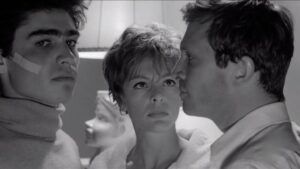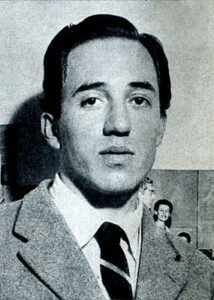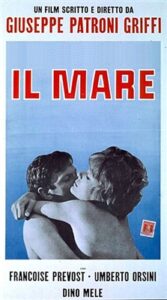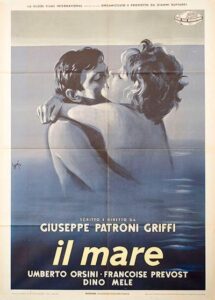Il Mare [The Sea] **** (1962, Umberto Orsini, Françoise Prévost, Dino Mele) – Classic Movie Review 12,604
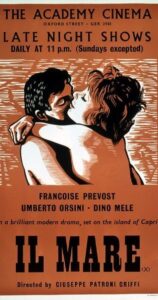
The rich and strange 1962 Italian film Il Mare [The Sea] chronicles a love triangle of desire, eroticism and violence, set and filmed in an impressively bleak and empty wintry Capri.
Italian master writer/ director Giuseppe Patroni Griffi’s rich and strange, long thought lost queer first film Il Mare [The Sea] can be seen as an Antonioni-style exercise in alienation or a precursor to Death in Venice. It is incredibly arty, extraordinarily visually striking and marvellously impenetrable.
Three insecure, isolated people land separately on the wintry isle Capri, each with more than their fair share of problems, the biggest being that they cannot reach out, cannot connect. [Spoiler alert] After circling around each other like wild animals in a zoo cage, they fail to communicate or to realise their secret desires. Like Capri in winter, they are frozen.
Il Mare’s unavailability for many years may be a total mystery but then so is the film. If it tells a story at all, it is one of the course of a triangle of desire, eroticism and violence, set and filmed in an impressively bleak and empty off-season Capri. You keep expecting to see Monica Vitti (from L’Avventura) or Dirk Bogarde and Bjorn Andressen (from Death in Venice) to pop up round one of its blind corners. But instead, you get Umberto Orsini as The Actor, Françoise Prévost as The Woman and Dino Mele as The Boy. Well, fair enough, they seem interesting company.
The Actor swans around the empty town and seaside, apparently waiting for the arrival of a woman, [Spoiler alert] who of course doesn’t ever arrive. He keeps spotting The Boy, and running into him, and circling around him. The Boy likes whisky and also apparently The Actor, though he seems very ambiguous about both, quite confused and uncommitted, but compelled into the The Actor’s company and to the next bottle. Weird, politically incorrect stuff happens. It gets vaguely sado-masochistic, like Dirk Bogarde and James Fox in The Servant.
Then The Woman turns up on the scene, there to sell her house after her marriage has ended. She’s very icy, introverted and alienated, even seeming odd in this company, but she still manages to get up enough enthusiasm to play with The Actor and The Boy. The Actor and The Woman even get together sexually, but lovelessly, and The Actor and The Boy is kind of the main event. The games the trio play are incredibly off the wall, and politically incorrect, which could be a lot of fun, but get nowhere. They are teasing and taunting, oddly compelling to watch, but in the end it’s all pointless and hopeless.
[Spoiler alert] The Boy says ‘Ciao’ (written on a bottle of whisky) and leaves the isle on the ferry, and The Woman leaves on a boat. The Actor chases after them (grabbing a taxi to see if he can stop The Boy leaving Capri). But it is too late, The Actor is left alone again, exactly as we saw him at the start of the film.
Ennio Guarnieri films this seriously beautifully and it is an admirable art object. Most every frame could be actually framed and hung in an art museum. The compositions are extraordinary, and there is intense interest in the actors’ hair or eyes and bodies, as well as in the Capri landscape. It is very crispy edited by Ruggero Mastroianni, and well scored Giovanni Fusco. As for drama and meaning, well, seek and you might find, or then again not.
The three main actors work hard for it, under difficult circumstances, and all three are perfectly cast in their roles. Umberto Orsini is bland and narcissistic, Dino Mele is feral and brooding, and Françoise Prévost is movie star alluring, You might feel you’d like to enjoy it more or understand it better, but it’s hard not to admire it for relishing, and bathing in, the courage of its convictions. Yes, it’s haunting and powerful, but as a meditation on loneliness it is as cold and alienating as its characters or as Capri in winter. Yes, of course, that’s the whole point.
By the way, it’s Italy 1963, there must have been a few raised eyebrows. Note how the Italian posters picture only The Actor and The Woman, and ignore The Boy.
And the title? No idea, except that the characters are all at sea of course.
Also in the cast are Gianni Chervatin, Celestino Cafiero, Renato Scala, Renato Terra, Giuseppe Ferrari, Salvatore Di Pasquale, Anna Ricci, Pasquale Esposito, and Alfredo Di StefanoI.
It was released in Italy in 1962 (Venice Film Festival), in the United Kingdom on October 1962 (BFI London Film Festival), in the United States on September 17, 1963 (New York Film Festival), and in the United Kingdom on March 7, 1964 (London).
Giuseppe Patroni Griffi (26 February 1921 – 15 December 2005) was a prominent Italian playwright, screenwriter, director and author. He was born in Naples in an aristocratic family and moved to Rome just after World War Two. His films as director include Il Mare (1962), Metti, una sera a cena (1969), Addio, fratello crudele (1971) with Charlotte Rampling and Oliver Tobias, Identikit (1974) with Elizabeth Taylor, The Divine Nymph (1975), La gabbia (1985), La romana (1988), Tosca (1992), and La traviata (2000).
© Derek Winnert 2023 – Classic Movie Review 12,604
Check out more reviews on http://derekwinnert.com


